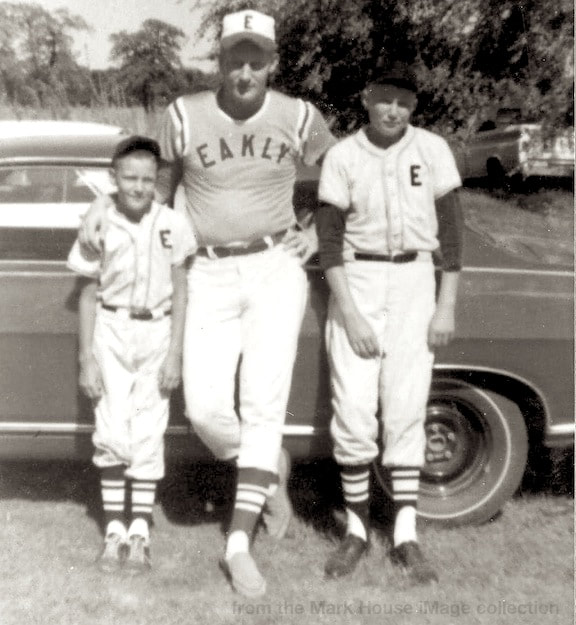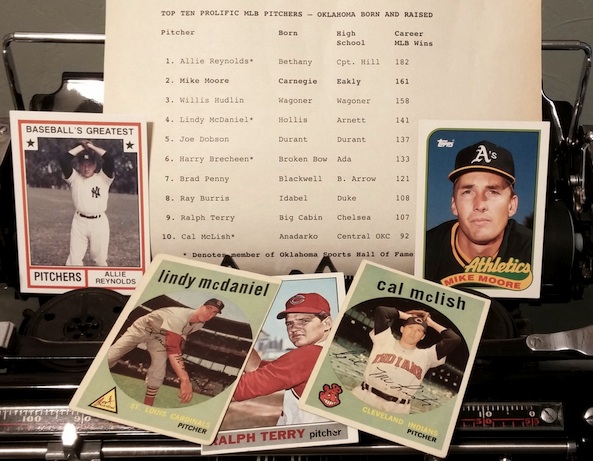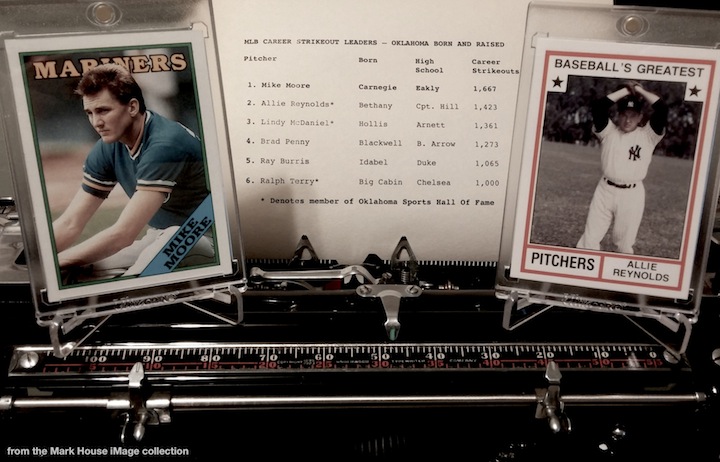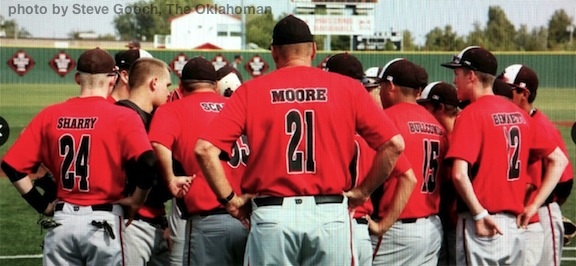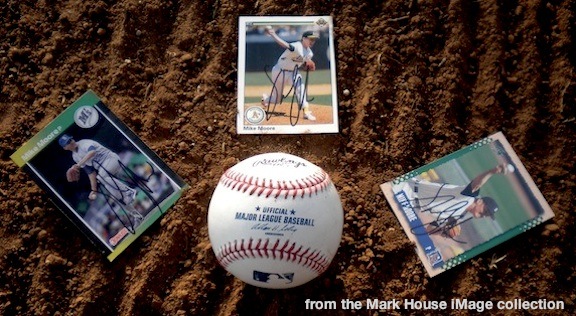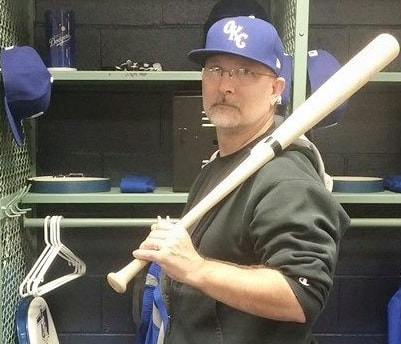As a young OK Kids little leaguer growing up on several north Caddo County fields of dreams, there was always a particular one in Eakly, Oklahoma, that, at the time, seemed more of a petrifying nightmare than the old guy behind the curtain on the Wizard Of Oz. That is before they opened it. More frightening than all those black birds in "The Birds" combined. More terrifying than the hairy red eyed big foot monster my dad said he saw down by Gracemont. In more current terms, a lot scarier than that big slobbery dog in Mr. Mertle's (James Earl Jones') back yard.
Luckily I was young enough to not have to face such spine-chilling fear. As for my elder little league friends, well, they weren't so lucky. The horror stories they would share of facing one particular pitcher on that field in Eakly was enough to make me glad of a personal safety found in being the most youthful of this group. Young enough to never have to pull the curtain to see what was behind. Young enough to never have to jump in a phone booth as those birds cracked the glass in attack. Young enough to not even have to worry about jumping Mr. Mertle's fence to retrieve a home run ball all-the-while dodging a huge rabid looking monster of a dog. Young enough to not have to face the fierce and fiery fastball of Eakly's Mike Moore.
Here's where the psychoanalytical Dr. Phil would interrupt and point out the fact that Mike Moore psychologically won half of his little league battles before taking the field. Players sitting around eating their mommas pre-game balogna sandwiches and sweating bullets about facing the phenom all the others have been talking about. "If they couldn't do it, well I don't have a chance" mentality is a losing proposition from the git go. A cue card guy then holds up a "laughter with applause" sign for the crowd as we go to commercial break.
There's definitely some great drama to be created in and around the game of baseball. Entertaining theatrical productions such as The Sandlot, Field Of Dreams and Bull Durham are prime examples. But, when it comes to real stuff and the real deal, Mike Moore is one that does not sell us short with his story. My friends can attest from the early days that he was somewhat opposite of the ole Wizard known as Oz. As a hitter, you pull the curtain on Mike Moore and your courage could vanish like that of the old downtrodden Lion walking the yellow brick road with Dorothy, Toto, The Tin Man and the Scarecrow.
What a great baseball story originating from the dusty ole peanut fields of Caddo County and ending up on a pitcher's mound in sunny California with sweet victory in World Championship Series play for the Oakland A's. From a proudly worn little league uniform with an iron-on E to the MLB with a more glorified and perfectly stitched A's cap. This only happens for a chosen few. A chosen few with such a high level of natural talent and the highest level of work ethic to match.
The enjoyable part now is just laying out the facts and figures in front of all to see as the most important career MLB victories pretty much speak for themselves. Mike Moore played for the Seattle Mariners from 1982-1988; the Oakland Athletics from 1989-1992; and the Detroit Tigers from 1993-1995. Within this fourteen (14) year span, it is my conclusion that he has earned the right to be considered one of the greatest, if not the greatest, pitcher born and raised in our grand state of Oklahoma. Knowing I'm not quite considered an expert, I broke out the old school typewriter and dug around in the old ball card box to visually enhance the interesting but rarely thought of conclusions in regard to Oklahoma's Top Ten Most Prolific Pitchers.
Now for the numerous and vintage Allie Reynolds fans, they will always possess the right to argue in his favor as being Oklahoma's greatest born and bred. What a great man and baseball player the "Super-Chief" was. His 5x all star representation of Oklahoma keeps me walkin' a fine line of respect when it comes to my personal thoughts of Mike Moore possibly being the greatest.
The debate could go either way on any given day when you compare golden age victories to modern day MLB victories. Reynolds has 182 golden year wins compared to Moore's 161 modern era victories. Reynolds pitched for the powerhouse five in a row World Series Champion New York Yankees. Although drafted #1 in 1981 as the best amateur baseball player in America, Moore had to pitch a large and early part of his career for one of the worst teams in Major League baseball in the Seattle Mariners. If afforded a pitching preference, are you taking DiMaggio, Mantle and the powerhouse Yankees or Dave Henderson, Harold Reynolds and the young upstart Seattle Mariners?
Whichever way a person chooses to look at it, both Allie Reynolds and Mike Moore are at the top of a very short Oklahoma's best list. Reynolds is in the Oklahoma Sports Hall Of Fame while Mike Moore deserves to be with his amazing 161 modern era career victories being the reason I have nominated him for such Hall Of Fame status. Other Oklahoma born and raised pitchers currently in the Hall Of Fame include Lindy McDaniel with 141 victories and Harry Bracheen with 132. Ralph Terry was more recently (2015) inducted with 107 career wins and my fellow Caddo County born Cal McLish has been inducted with 92 career MLB victories.
If 161 modern day MLB victories is not enough, more solid evidence exists to convince any and all sports enthusiast juries of Mike Moore's superiority relative to pitchers born and raised in Oklahoma. A factual offering founded upon hard core direct-to-the-case statistical proof. Those who know me recognize I can blow some quality smoke of the verbal variety and are most likely reading between the lines as we speak. Makes for good reason to single space and bring some of that solid statistically analytical databased information to this most enjoyable debate table. There's no denying a truth revealed when it comes to career strikeouts!
We all know a strikeout is the ultimate claim of success for any pitcher. Man vs. Man. eMano vs. eMano. Baseball at its best. The ultimate fan wish is either a towering home run from their favorite hitter or a sit down see-ya-later strikeout from their favorite pitcher. Tedious singles up the middle can get rather boring at times. I'm guessing no one has ever truly taken time to check out and recognize who's at the top of Oklahoma's best list when it comes to this hardcore hardball thought of these man vs. man career total strikeouts for Oklahoma pitchers at the ultimate Major League Baseball level.
Only six Oklahoma born players have broken the 1,000 career strikeout plateau. Mike Moore's top-of-the-list 1,667 averaged per season calculates to 119. Allie Reynolds 1,423 averaged per season adds up to 108.5. On average, no one else comes close to these two great pitchers born and raised in our great state. Moore's 119 per season even rivals that of the great Warren Spahn from Buffalo, New York. Considered Oklahoma's greatest pitcher not born and raised here, this great lefty averaged 123 strikeouts per season. So, where does Mike Moore fit into the realm of Oklahoma's Greatest Pitchers? I will argue he's the best when it comes to the red dirt, red blood, born and raised category.
Personally, I view Mike Moore's potential of induction as becoming a time stamped inspiration to current student athletes in my home county. This with hopes that yet another young Caddo County ball player may recognize what the likes of Johnny Bench, Cal McLish and Mike Moore have accomplished and possibly set out on a successful journey of their own. With similar and great natural talent combined with determination and hard work, who knows, maybe they are the next generation's inductee into the Oklahoma Sports Hall Of Fame?
There's been plenty of nose-to-the-grind research to support my request for Oklahoma Sports Hall Of Fame nomination consideration and ceremonious induction for Mike Moore. He was a standout student athlete for the Eakly Oklahoma High School Eagles. With a 24-2 senior season record and an unbelievable .05 earned run average (E.R.A.), Moore earned his final high school victory while being selected MVP in Oklahoma's 29th Annual All-State Baseball Classic in 1978.
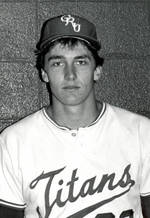 Mike Moore
Mike Moore Two Oklahoma players were selected at the top of Major League Baseball's 1981 amateur draft. Eakly's Mike Moore of Oral Roberts University was selected number one (#1) by the Seattle Mariners. Oklahoma City's Joe Carter of Wichita State was selected number two (#2) by the Chicago Cubs.
Baseball Almanac indicates MIKE MOORE was twenty-two (22) years old when he broke into the majors with the Seattle Mariners on April 11, 1982. Pinnacle highlights of Moore's 161 WIN fourteen year MLB career include 1989 MLB All-Star status and pitching in two World Series Championships for the Oakland A's in both 1989 and 1990. Moore won game two and game four in the '89 "Quake Series" sweep vs. the S.F. Giants as the A's became World Champs.
Moore recently returned to his Oklahoma roots and now spends time giving back to the game in this state where he was born and raised. As a volunteer coach for Class B powerhouse Lookeba-Sickles Panthers, he currently shares the benefit of his professional experience and knowledge with the latest generation of Oklahoma High School student athletes. Another great reason Mike Moore deserves honorary induction into Oklahoma's Sports Hall Of Fame.
Oklahoma sports reporter Jacob Unruh recently captured the essence of Mike Moore's career in The Oklahoman's long running "Collected Wisdom" series.
Unruh writes "Mike Moore was always on a baseball field growing up in Eakly. That translated well throughout his life, as he developed into a top-tier right-hander in the major leagues, winning two games in the 1989 World Series for the Oakland Athletics during his 14-year career.
Moore is now a volunteer assistant coach at Lookeba-Sickles, a sign he’s never lost sight of his small-town roots that led him to Oral Roberts and the No. 1 overall draft pick in 1981.
Moore talked from his Arizona home with The Oklahoman about his path, the World Series and the 1989 earthquake that rocked the Bay Area around San Francisco 25 years ago this month.
(Baseball) was what we did. It was just what we did. I can’t remember really when I wasn’t in the field growing up. The primary crop was peanuts then and I was the youngest of five kids and I can remember at the age of 3, 4, 5 years old carrying the water can down the road for the rest of my family.
Unknowingly, by the time I got to the high school, working on the farm had really made me into the man I am today. I would do things, manual labor stuff and just different things around the farm I didn’t even know were helping me in baseball. It really taught me the values of hard work and when you do something you put your whole heart on it.
By this time (at ORU), I had an idea that maybe I had some talent. I still really don’t know because all you hear is ‘Oh, he went to a small school and he didn’t compete with anybody’ and blah, blah, blah. Well, now I’m going to a Division I school. It was interesting at the time, Larry Cochell recruited me and he never saw me pitch. He went off a lot of what scouts said. He had already given me a full scholarship and the first time he saw me pitch was at the All-State game at ORU.
I tell people I’m not the sharpest tool in the shed but when I got drafted No. 1 in the country I didn’t think I’d get drafted any higher, so I should probably just go ahead and sign.
I was the first right-handed pitcher ever drafted No. 1 in the draft. Back then, it wasn’t that big of a deal. Even today kids ask me if I was any good. I just tell them I was the original Stephen Strasburg. It just wasn’t that big of a deal then. At that time, even when I got to the big leagues I was throwing on the slow guns 97-98 in the ninth inning and the made-for-TV guns I’m probably throwing 100-103. It just wasn’t a big deal then.
That’s the bad part of getting drafted No. 1 because you go to the worst team. I had never lost at anything in my life and then I go the big leagues and get beat up on for seven years playing for the Mariners.
We had some great guys on that team, but at the time we had bad ownership and we were like a farm system for the big leagues. Harold Reynolds was my roommate for a couple years, Jim Presley was our 3B, Spike Owen, Alvin Davis at 1B, Mark Langston and Danny Tartabull, really a bunch of guys who had really successful careers, but when you’re playing in the Kingdome, which is awful for a pitcher, and you were playing in Seattle with bad ownership it just didn’t work.
I signed (in Oakland) in ’89 and they had just lost to the Dodgers in ’88 and I walked into the clubhouse and they’re talking about winning the World Series. They’re not talking about winning the division. Tony (La Russa’s) already set the bar that we’re going to have to win 100 games to win the division and the goal is to win the World Series. I thought this was interesting, but I had never been in this position for seven years.
I think most people would tell you the same thing, the greatest thing about being with (Dave Duncan) is he doesn’t say much, but when he says something there’s a reason why he says it. He’s never overcomplicated things and that was one of the things I always loved about him. He was actually my pitching coach my first year in the big leagues in Seattle.
Tony, he’s the best manager I’ve ever played for. He’s harder on himself than anybody. He’s probably harder on himself than most players are because he wants to be the most prepared manager and he wants to control matchups and there’s always a reason for what he does. It may not make all the sense in the world at the time, but there’s a reason. He’s usually looking at the big picture.
I remember the first World Series game, I remember preparing for it like any other game because I figured if I didn’t I would be out of my element. We had a game plan and I had to get myself ready physically and mentally to execute the game plan, so that’s what I did.
At the time, we didn’t really know what was going on. I remember we were getting ready for TV introductions, I had done all my workouts and stuff, and showered and was getting dressed. The lights went out and somebody yelled, “Earthquake,” and we all ran to the back parking lot and it was over. We didn’t know any better and had TV introductions at 5:12 or something. I stopped at home plate and was talking to Will Clark and then we started talking to a police officer and we started hearing the (San Francisco Oakland) Bay Bridge had collapsed and the Marina District was on fire, so you started having an idea what was really going on. At that point, the World Series became secondary.
We had the best team in baseball — I don’t think there was any doubt about that — it was just a matter of whether we would finish this or not. Even after we won, the celebration and stuff was pretty subdued because of what was going on there and stuff.
The next year was a totally different story and that shows you it doesn’t matter who the best team is, when you get into the playoffs or World Series whoever is playing the best wins. We ran into Cincinnati that year and we really didn’t have a chance. We couldn’t swing the bats and Jose Rijo was really good.
If I had one regret, it would probably had been fun to play in the National League one year just to see what it was like because I was always a pretty good hitter. That might have been fun, but it is what it was and I enjoyed it.
Don’t get me wrong, I’ve had some screw-ups along the way, but I try to live my life with integrity because where I grew up a handshake’s a handshake and a man’s word is a man’s word. I’ve tried to live that way my whole life. If you try to live your life with integrity and put your whole heart into what you’re doing, I don’t think you’re ever going to be disappointed."

